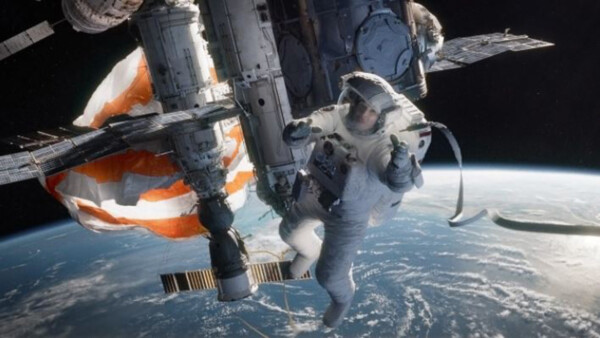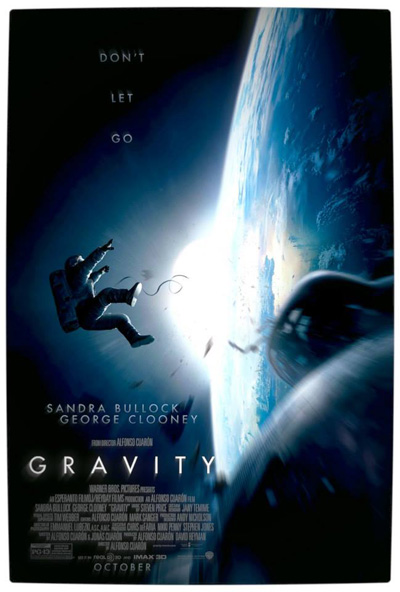Del and Mladen review ‘Gravity’

Image courtesy of Warner Brothers.
—
“Gravity” Starring Sandra Bullock and George Clooney. Directed by Alfonso Cuaron. 91 minutes. Rated PG-13.
Del’s take
“Gravity” is a stunning spectacle of special effects and a riveting depiction of the human will to survive. But its characters are thinly sketched and their motivations contrived, which pulls the movie from the lofty realm of a classic to the merely good, despite the “buzz” and Oscar talk.
In “Gravity,” Sandra Bullock plays Dr. Ryan Stone, a mission specialist, on her first space shuttle flight. She and old hand astronaut Matt Kowalski (George Clooney) are part of a Hubble Space Telescope repair team which falls afoul of a Russian anti-satellite test gone wrong. The ensuing cloud of orbiting debris, traveling at thousands of miles per hour, destroys their shuttle and leaves Stone and Kowalski in orbit – alone.
They must make their way to the International Space Station, and from there a Chinese space station, all the while dodging a killer cloud of orbiting junk and racing against the clock before their oxygen is depleted. At every turn their efforts are thwarted by the expected and unexpected perils presented by spaceflight.
The star of “Gravity” is not Bullock but the special effects. We did not see the 3-D version but I expect it is spectacular. Even in 2-D you feel as though you’re floating above the earth with nothing between you and the ground but 150 miles of vacuum and 50 miles of air. For sufferers of acrophobia (like yours truly) the view was sometimes sweaty palm-inducing. Never in a movie did I feel as though I were actually there, and the claustrophobia of being confined to a spacesuit with no option to pop the helmet and take a breath of fresh air was so pervasive it almost became a third character.
And “Gravity” is an edge-of-your-seat thriller to be sure. Pauses in tension are few, and you’ll come out of the theater with aching muscles as you tried to help Bullock push this way and pull that. In that respect “Gravity” strikes me as more of an “Armageddon” and less of an “Apollo 13.”
As I said, the characters are thinly sketched, which may have been a necessity given “Gravity’s” narrative structure. Still, we get to know Dr. Stone somewhat but nobody else, including astronaut Kowalski. As you might expect under the circumstances Stone has a fatalistic view of her outcome and it is amplified by the loss of a child, requiring that she be coached and encouraged by Kowalski. That struck me as contrived and unnecessary. No matter how highly educated and motivated astronauts can be, and no matter what their burdens, when the issue at hand is survival every individual will behave predictably, and try to live. Bullock’s character does evolve during the movie, and that’s what all good characters do: They change as a result of their experiences. But in Bullock’s case the change seemed forced.
I found it puzzling Cuaron chose to abide by some scientific principles and ignore others. After reading astronomer Neil Degrasse Tyson’s enumeration of the scientific errors in “Gravity,” I came prepared to ignore them for the benefit of watching a great story. But during the movie I found myself distracted by the implausibilities.
Is “Gravity” the best movie of the year? Is Bullock’s performance worthy of an Oscar? I would say no on both counts. While “Gravity” is entertaining, and Bullock’s performance commendable, I didn’t come out of the theater with any lasting impression of either.
Still, it’s nice to see a film that isn’t a sequel and isn’t based on some “blockbuster” premise make its way to theaters and do well at the box office. Maybe Hollywood can take a lesson from “Gravity” and return to making films from original stories.

Mladen’s take
(Spoiler alert)
“Gravity” is one of my worst movie-going fears realized, a film promising action but delivering little more than maudlin introspection.
The movie betrayed me. It also betrayed Del, though he doesn’t fully accept it.
Del summed the plot nicely. A series of improbable events sires both the prospect of our heroine dying alone in space or surviving despite implacable odds.
Had “Gravity” fulfilled its promise, what I would’ve seen was an intelligent, nicely configured middle-aged woman give fate the middle finger as she demonstrated what training, technical prowess, and a will to live can accomplish.
In response, fate would’ve contributed not only dumb-ass Russians inopportunely blowing up one of their own satellites to create a hypervelocity constellation of space debris holing everything in its path, but also micrometeorites, sun flares, gravitons, an atmosphere salient jutting far into space that threatened incineration if entered, and an interesting sidekick for Stone rather than the quasi-cowboy-like character portrayed by Clooney.
Instead, the film yields sequences of free-floating, spin-induced disorientation and bodies slamming into solid objects such as space modules. Each bit of extra-atmospheric action is followed by moments of a person talking to herself about staying hopeful and alive. Hell, Stone even references Heaven at one point, though earlier she had said to herself that she never prays. This “no-one-in-a-foxhole-is-an-atheist” triteness only added to the movie’s superfluous feel.
Efforts to convey the spiritual impact of what Stone and Kowalski, and then Stone alone, faced were as empty as the vacuum of space. Kowalski’s seemingly unselfish and chivalrous suicide was nothing of the sort because it was unnecessary.
Suicide comes along again when Stone, ensconced in a Russian – there they are again – Soyuz vehicle, decides there’s no chance of surviving. She turns off the capsule’s oxygen supply and begins to pass out when there’s a knock on the capsule’s door. It’s handsome Kowalski waving to her through the door’s portal. The silliness of it just about exploded my head.
Kowalski, of course, is a figment of Stone’s oxygen-starved imagination. The apparition, after he takes a swig of vodka craftily hidden aboard the capsule by one of Kowalski’s cosmonaut friends, tells Stone how to make the best of a very, very, very, very, very bad situation. Yes, the capsule’s main engine is out of fuel, but its soft-landing thrusters have the juice to get her to the Chinese space station, which has a fully functioning return-to-Earth capsule.
A fiery atmospheric reentry scene and near-drowning later, Stone swims to the shore of a pristine lake surrounded by an idyllic land, not a single artifact of humanity in sight. Stone is going to get a fresh start was the message of the film’s last scene.
Who cares?
Not me.
Mladen Rudman is a former journalist and technical editor. Del Stone Jr. is a journalist and author.
![]()
Leave a Reply